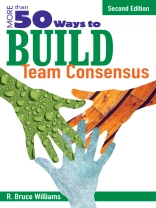’As a single source of ideas for facilitators and school leaders, this book is excellent. The author very thoroughly covers the material, and the procedures are easy to follow.’
-Stephen H. Laub, Principal
Rolla Junior High School, MO
Foster committed, participative teamwork in any environment!
Today′s workplace is increasingly shifting from top-down, authoritative leadership to engendering participation from all the stakeholders in a team. In response to this ever-growing trend, R. Bruce Williams provides group facilitators with insights and research about teams working together to reach consensus and accomplish their goals. This revised edition presents current brain research and its implications for team leaders and members, and explores the growing importance of participative processes in collaborative working environments.
In a user-friendly format, Williams offers more than 50 practical, step-by-step activities and strategies for immediate implementation, with real-life examples to assist in the consensus-building process. The activities address the four main components of full consensus:
- Creating a purposeful vision
- Effecting participative processes
- Fostering individual commitment
- Building strong collaborative teams
Use this valuable 'road map’ to set the stage for establishing consensus and effecting successful collaborative teamwork!
Spis treści
Preface
Acknowledgments
About the Author
Introduction to Building Team Consensus
I. Purposeful Vision
1. Visualizing the Common Direction: Simple Things to Do
Hopes and Desires Conversation
Snapshots
Brainstorming Closure
TV Personality in Three Years
Common Direction Written Summary
Past, Present, and Future Images
2. Creating Visible Documentation: Things That Take Effort
Cardstorming
Meeting Products Documentation
Artifacts
Report
Wall Decor of Meeting Products
Article
3. Illuminating the Total Framework: For the Committed
Journey Wall
Global Events Conversation
Newsletter
Organization Principles Workshop
Purposeful Vision Chart
All the Stakeholders
II. Participative Processes
4. Generating Total Participation: Simple Things to Do
Creating the Real Question
Eventful Happenings
Sticker Dots
Language
TV News Spot
Questions Not Dictums
Carousel Solutions
5. Organizing the Meeting Focus: Things That Take Effort
One Concrete Product
Time Flow Picture
Meeting Space
Materials
Meeting Plan Forms
6. Tapping the Group Agreement: For the Committed
Guidelines for a Consensus Outcome
Workshop Flow
Three-to-One Scenarios
Cooperative Writing Workshop
Mapping the Road to Agreement
Agreement: State and Restate
Testing for Consensus
III. Individual Commitment
7. Eliciting Detailed Assignments: Simple Things to Do
Task Volunteers
What/Who/When Cards
Timelines
Attendance
Assignment Chart
8. Expanding Personal Recognition: Things That Take Effort
Specific Praise
Individual Celebrations
Training, Coaching, or Project Feedback
Use of People’s Names
Personalized Job Tools
9. Occasioning Individual Accountability and Absolution: For the Committed
Short Weekly Meetings
“I Am Nervous About” Conversations
Implementation Lesson Conversation
A Victory Party Before the Victory
Symbol of Commitment
IV. Collaborative Teams
10. Intensifying Team Identity: Simple Things to Do
Team Member List
Team Name
Team Flag or Symbol
Team Motto
Team Song
Team Rituals or Rites
11. Increasing Supportive Connection: Things That Take Effort
Winning Team Story
Leadership Rotation
Icebreaker Opening Conversation
Dyad or Triad Brainstorming
Making the Differences Visible
Team Victory Celebration
12. Enhancing Group Reflection: For the Committed
Processing Partners
Content Processing
Meeting Processing
Teamwork Processing
Logs or Journals
Career Motivation Conversation
Conclusion
Bibliography
Index
O autorze
Bruce Williams has more than thirty five years of international consulting experience, and is noted for his expertise in group facilitation and in planning and team building methodologies. Williams′ specialty is facilitating participative, interactive group workshops whether they are focused on strategic planning and consensus building or instructional methodologies for the classroom. He has conducted successful workshops on brain compatible learning and school change facilitation, and he frequently presents in the areas of cooperative learning, higher order thinking skills, and authentic assessment. With seven years′ experience in teaching English as a second language in Japan and Korea, Williams is highly experienced in working with diverse populations. Thirty-six years′ experience in adult training also make him a valuable resource in facilitating school change. In addition to conference workshops in 2002 in Australia and New Zealand, he has been invited three times to present workshops for teachers in Singapore. In April of 2004, Williams was the keynote speaker for 400 principals and teachers in Beijing.












